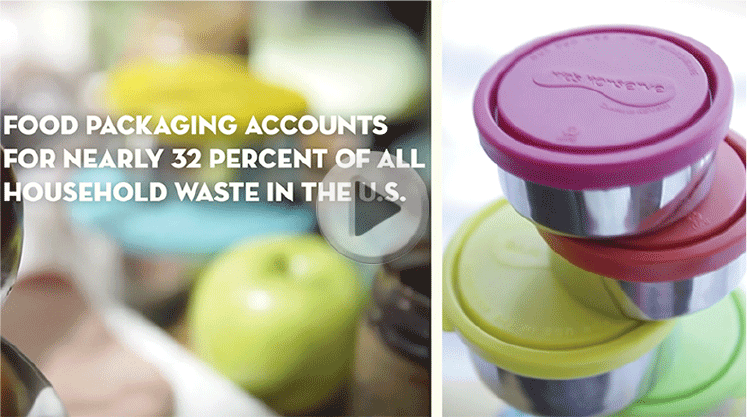Product Information
Our products in use
Why upgrade to platinum-grade silicone
Our silicone lids fit all of our stainless steel containers and are a perfect choice for a completely plastic-free lunchbox. The benefits are endless: plastic free (of course), leak proof (and airtight), durable (crack free), flexible (easy for little hands to open), dishwasher safe (easy to sanitize), resilient in high temperatures (and in the freezer) and clear as glass (and colorful options too). See our new silicone options here.
Not just for school lunches
Which container is right for you?

Product safety and testing
We offer non-toxic, safe products that are tested by CPSIA-accredited independent labs to ensure that they are free of BPA, BPS and phthalates.
Product materials & care
Stainless Steel Containers are made from 18/8 stainless steel. Silicone lids are made from platinum-grade, food-grade silicone that pass strict EU LFGB standards. Plastic lids are made from LDPE #4 plastic. Plastic dividers are made from PP#5 plastic. All are dishwasher safe, top rack. Plastic lids and dividers are dishwasher safe but research has shown that it's best to keep plastics out of high temperature environments. Containers and lids are freezer safe. Containers are oven safe up to 300 degrees F. Containers can be used at higher temperatures or under the broiler (without the silicone cover), but above 450 degreess F the steel may discolor. Discoloration does not affect performance. Do not use above 600 degrees F.
Insulated Containers are made from 18/8 stainless steel. 18oz Food Jars have an all-stainless interior, and lid has a silicone seal with PP#5 inside plastic rim (that does not come in contact with food). 18oz Food Jars should be hand washed. 12oz Food Jars have PP #5 plastic lid and base and are dishwasher safe, top rack. Plastic lids are dishwasher safe but research has shown that it is best to keep plastics out of high temperature environments.
Insulated Lunch Totes are made from PET #1 recycled plastic bottles. Machine wash cold, line dry.
Ice Pack covers are made from PET #1 recycled plastic bottles and can be machine washed in cold, line dry. Gel pack inserts are made from non-toxic sodium polymer and should be cleaned by rinsing with soap and water.
Bamboo Utensils are made from sustainably harvested bamboo and finished with a food-safe oil. Hand wash, air dry. Recycled cutlery case is made from PET #1 recycled plastic bottles and can be machine washed in cold, line dry.
Stainless Steel Straws are made from 18/8 stainless steel and are dishwasher safe. Silicone Straws are made from food-grade silicone and are dishwasher safe.
Straw Brush & Bottle Brush are made from stainless steel, nylon and cotton. Dishwasher safe.
Plastic numbers explained
We use PET #1, LDPE #4 and PP #5 plastics in our products. We advocate for using plastic safely (not microwaving or heating), and getting to know your plastics. There are possible health risks with some types of plastics, so we only use plastics that are safe for food storage. All of our products are tested free of BPA and phthalates. If you are trying to reduce all plastic, see our Stainless Steel Containers with Silicone Lids.
#1 - PET or PETE - polyethylene terephthalate is used in many water and juice bottles. It is commonly recycled, and accepted by most curbside programs and recycling centers.
#2 - HDPE - high-density polyethylene is common in milk jugs, detergent and shampoo bottles. It is usually accepted by most curbside programs and recycling centers.
#3 - PVC - vinyl or polyvinyl chloride is a known human carcinogen, often contains phthalates and is not recyclable. Phthalates add flexibility and durability to PVC and vinyl. They are present in products like toys, food packaging, plastic wrap, shower curtains, lotions, perfume, air fresheners and candles. Phthalates are listed as reasonably anticipated to be a human carcinogen by the National Toxicology Program, and are considered a probable human carcinogen and endocrine disruptor by the EPA. Even though phthalates have been banned from some baby toys and baby gear, they are still allowed in lunch bags and food containers, so always choose phthalate-free.
#4 - LDPE - low-density polyethylene is common in plastic bags, cling wraps, baby bottles and reusable drink and food containers. It is recyclable at most recycling centers and some curbside programs.
#5 - PP - polypropylene can be found in baby bottles, yogurt containers, and many reusable food and drink containers. It is recyclable in some curbside programs and most recycling centers.
#6 - PS - polystyrene is used in takeout food containers, Styrofoam containers and cups, and plastic cutlery. It has been found to leach styrene, a neurotoxin and possible human carcinogen, and has been banned in many U.S. cities. It is not easily recyclable.
#7 OTHER - This catchall category includes polycarbonate which has been found to leach bisphenol A (BPA), a hormone disruptor that mimics estrogen. Bioplastics (plant-based) are also in this category but cannot be recycled and are usually sent to landfill unless directed to a bioplastic-specific composting facility.
Insulated containers keep food and beverages hot and cold
Our stainless steel Insulated Containers keep food and beverages hot or cold for several hours. They're designed to keep the temperature you start with, so pre-heat by pouring very hot water inside and letting sit for a few minutes before pouring out and adding your piping hot food, and pre-chill in the freezer for a few minutes (lid off) before adding your cold food.
Product manufacturing




